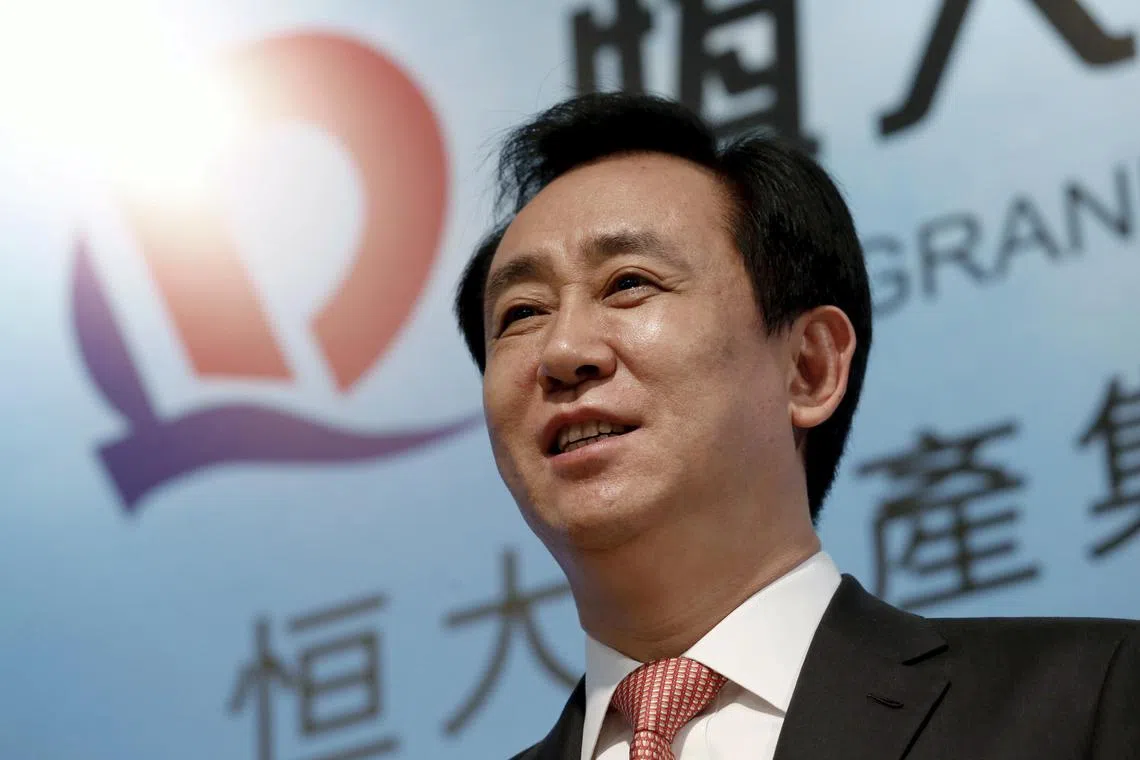Evergrande chairman, once worth $56 billion, loses 93% of wealth
Sign up now: Get ST's newsletters delivered to your inbox

China Evergrande Group chairman Hui Ka Yan is among China’s five richest property tycoons who have lost about US$65 billion combined in the past two years.
PHOTO: REUTERS
HONG KONG – Mr Hui Ka Yan was once one of China’s richest and most influential titans, bridging the worlds of business and high-level politics.
These days, the China Evergrande Group chairman’s fortune has considerably diminished – by about 93 per cent. He is down to about US$3 billion (S$4 billion) from US$42 billion (S$56 billion), which once made him the second-richest person in Asia, according to the Bloomberg Billionaires Index.
China’s five richest property tycoons lost about US$65 billion combined in the past two years, the index shows.
Mr Hui is also finding himself increasingly isolated politically, with the latest signal coming from the Chinese People’s Political Consultative Conference (CPPCC), an elite group comprising government officials and the biggest names in business.
Mr Hui had been part of the political advisory body since 2008 and of its elite 300-member standing committee since 2013, but he was told not to attend the annual convention last year as his property empire became the biggest casualty of the nation’s credit crunch.
Now he is not even included on the latest list released on Wednesday of those who will form the CPPCC for the next five years.
While his exclusion is striking given the position he once held, Mr Hui has lots of company.
Shimao Group Holdings’ Mr Hui Wing Mau, Guangzhou R&F Properties co-founder Zhang Li and Mr Hoi Kin Hong of Powerlong Real Estate Holdings are among the property magnates who are no longer part of the CPPCC.
The move reflects China’s shifting attitude towards property developers, many of whom have fallen from grace amid a years-long real estate crisis that threatens the broader economy.
The new CPPCC members will head to Beijing in March for the group’s 14th national committee to discuss everything from political and social issues to new laws and the nation’s growth.
“The CPPCC role is like an honorary reward that China gives to faithful business people to make contributions to the country,” said political analyst Willy Lam, an adjunct professor at the Chinese University of Hong Kong, who has authored several books about Chinese politics.
On Evergrande’s Mr Hui, he added: “It is not surprising at all that property tycoons like Hui, who created trouble in the property sector with their over-leveraging, are out of the list.”
Still, Mr Hui – a Communist Party member for more than three decades – is the most high-profile developer to feel the squeeze. His valuation on Bloomberg’s wealth list tumbled after accounting for money that Evergrande said its founder injected into the developer and demands from creditors.
Evergrande first defaulted on US dollar bonds in 2021 and has more than US$16 billion of outstanding dollar notes. After missing several self-imposed deadlines to deliver a preliminary restructuring blueprint, it proposed this week a restructuring plan with two options, people familiar with the matter said. Its shares have been suspended for almost a year after the company failed to report 2021 results, and PwC resigned as its auditor on Monday.
Shimao, also a defaulter, has had its stock suspended since last March too. R&F’s Mr Zhang was arrested in London late last year on United States bribery charges and is confined to his five-bedroom penthouse apartment after posting a record US$16 million bail.
Powerlong, another casualty of the crisis, has lost more than 80 per cent of its value from a 2021 peak.
President Xi Jinping’s “common prosperity” drive to redistribute wealth has led to crackdowns in several industries.
For the real estate sector, the imposition of a strict policy to curb debt has exacerbated a crisis that is affecting banks, trust firms and millions of home owners. BLOOMBERG


